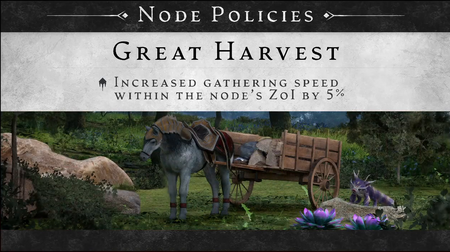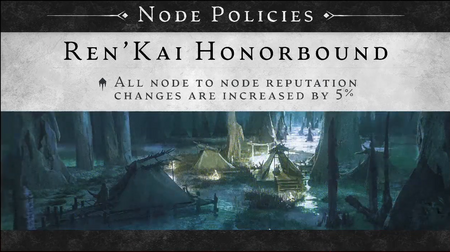Node mandates

The more citizens like what a mayor is doing, the more power they're going to get to do more things; and the less citizens like what they're doing, the less power they're going to get to do things.[2] – Chris Justo
Node mandates are an energy system that enables mayors to take actions within a node.[1][2]
- Citizen participation in policy votes, construction, mayoral commissions, mayoral caravans, node wars, and node sieges generate mandates for the mayor.[1][2]
- Mayors can utilize their available mandates to adjust taxes, bypass policy votes, initiate construction, initiate expansions, and certain mayoral commissions.[1][2]
- A newly elected mayor may begin their term with "a couple" of default mandates.[3]
- Unused mandates at the end of a mayor's term will be lost.[3]
- We're concerned about limiting how much damage a bad faith mayor can do; and this is definitely one of those systems that if you're doing good things that the citizens are agreeing with- and this is part of your power as a citizen even if even if you think you don't have any power- this is one of your main things is agreeing with what the mayor is doing makes them able to do more actions; and that are hopefully are favorable for you.[2] – John Collins
- Q: Is there a cap on the energy for mandates?
- A: There is not currently a cap that's designed for mandates. However, mandates are an accrued energy through action and actions have cooldowns associated with them that you can do them over certain periods of time; and they also have certain weights that are applied by design. So naturally within a given period of time a mayor will only have the ability to do so many things that generate mandates; and as a result that is the soft cap. However, the system is built- or is being built- in such a way where that is a variable we can define through testing when we see if there should be, or should not be, we can add that at a later time.[4] – Steven Sharif
Mayors
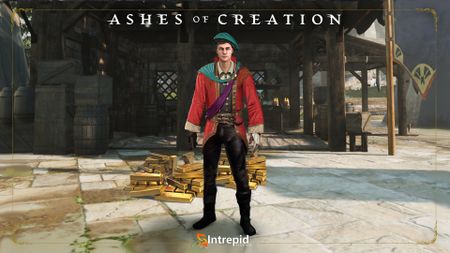
Mayors have a unique ability to elicit change within the node proper, either through the destruction of certain buildings that have been constructed previously, because there's a limited number of slots that buildings can be constructed within, or the kickoff of additional projects, or the certain types of policies that can be enacted, like... the changing of a tax rate. They all have a unified source of energy requirement and the energy requirement is a mandate.[2] – Steven Sharif
Mayors are chosen through different election methods according to the node's type.[6][7]
- Only node citizens may be elected mayor.[8]
- Previous mayors won't have any special system driven bonuses to help them get reelected.[10]
- Kings and Queens can also become a mayors.[8]
- Mayoral leadership powers are granted via the use of mandates.[2][11]
- Players will be able to view a historical listing of mayors of a node.[12]
Mayoral commissions

Mayoral commissions serve as a strategic decision base for the mayor. What issues am I facing? What issues do I believe I will face? How is this aligning with my strategy? And then how will my citizens help me help participate in accomplishing these goals so that I'm best set strategically for what I intend to do with those commissions?[14] – Steven Sharif
Mayoral commissions are simple types of quests with singular objectives that are able to be initiated by mayors.[1][13][15]
- Mayoral commissions cost gold from the treasury for the mayor to initiate.[1][13]
- There are a limited number of commission slots available to be set by the mayor at any one time.[16][13]
- Access to commissions is based on node type, location, building choices, and predominant node race.[1][13]
- There will be a cap to the number of commissions that can be accepted by a single player.[16]
- Completing mayoral commissions will reward the node with node commodities, node-to-node reputation, mandates, and temporary buffs to buildings or zones.[1][13]
- Players will receive experience, node reputation, node currency, and other miscellaneous rewards.[1][13][15]
- Mayoral commissions can be conducted by both citizens and non-citizens, but only citizen contribution will generate mandates for the node.[16][13]
- Mayoral commissions are similar to commissions, which are system-generated quests that enable characters and nodes to gain XP.[17][16]
- Q: Is participation always going to be greater for larger nodes by default, or can a small node with close to 100 participation still greatly benefit from them?
- A: That's gonna come down to what commissions the mayor is initiating. Level three nodes aren't going to be initiating mayoral commissions that require thousands of players to participate, because they don't have access to those; where Metropolises that have a huge citizenship base will get access to those kinds of commissions. So the rewards will be proportionate to the node level and the expected amount of citizens.[18] – Chris Justo
Node policies
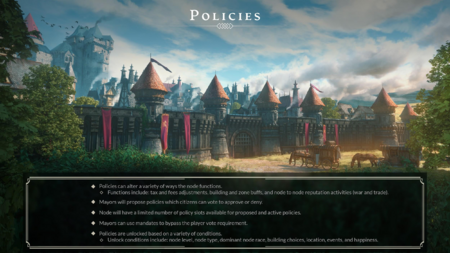
Nodes have a number of slots that they get to employ as Government policies that are enacted and chosen by the mayor and voted on by the people; and certain policies get unlocked by certain happiness states of the factions within the node; and those happiness states are predicated across different achievements that can happen in the world story arcs that get finished; bosses that get killed around you; new buildings that get constructed: Lots of different things can contribute to that happiness value: Number of citizens; number of citizens you've had leave; number of houses that might have been foreclosed upon. There's lots of different things that influence it, but when the happiness is met at a certain point- and even without that happiness you can still have policies that you get to enact regardless. You may choose policies that do certain things for the node; and this is a big strategic decision that the node has to almost agree on because it's voted on by the citizens within a short time period, but elected by the outstanding mayor; and when you deploy a policy it confers benefits to the citizens, or to the area, or to specific buildings, or to the mayor.[20] – Steven Sharif
Node policies affect a variety of node functions, such as taxes and fees, building and zone buffs, and node-to-node reputation activities, such as trade agreements, and node wars.[1][19]
- Mayors propose node policies that are voted on by citizens within a 24-hour or shorter time period.[1][19][20][21]
- Policies are voted in if the majority of voters approve of them.[22]
- Mayors can utilize their available mandates to bypass policy votes.[1][19][2]
- Mayors may also be able to take emergency actions depending on certain predicates that get met. This might allow them to reduce the voting threshold or voting time for policies.[22][20]
- There are a limited number of policy slots available to be proposed.[1][19] Some policies occupy multiple slots.[20]
- Node policies that are deployed will provide benefits to various aspects of the node, its citizens, its ZOI, its vassals (in some cases), specific buildings, and to its mayor.[22][20]
- Certain policies may affect the visual appearance of the node.[23]
- Some of the benefits you can receive by being a vassal of a certain parent is access to a policy that your node not might not normally have access to; and in fact you can also unlock an additional policy slot based on certain conditions that the parent or Sovereign node may have access to in their reliquary, or in their achievement systems, or in policies that they've elected. Some policies occupy multiple slots and it's almost like a card structure. You have each of these policies that live on a card and you get to select that card- throw it into the slot it goes out to the citizens to vote on within the 24-hour or sometimes shorter period. The mayor has emergency actions they can take right depending on certain predicates that get met and if an emergency action occurs they may be able to spend their influence as mayor within their term to set up a policy for a vote within an hour's period of time; and citizens in that way they can sneak it through a bit.[20] – Steven Sharif
Policies are unlocked by various conditions within a node.[1][19][20][21]
- Node level.[1][19]
- Node type.[1][19]
- Dominant node race.[1][19][20]
- Building choices.[1][19][20]
- Location of the node.[1][19]
- Events, such as node wars and node sieges.[22][1][19]
- Node happiness.[1][19][24][25]
- Achievements based on the completion of story arcs.[20]
- World bosses that are defeated.[20]
- Node citizens gained (or lost).[20]
- Node housing foreclosed upon.[20]
- There's a lot of different things that policies can influence; and policies exist within certain denominations. You have some policies that might be reflective of the culture that the node is representing; and you get access to those cultural policies. You have some policies that might become available because you've constructed a certain building type and now you've attracted a guild of NPCs that are weapons smiths. You might have some policies that are social organizations representative- you only get to build one social organization or Temple: which religion does the node follow. All of these are customization points that the city gets to choose and now you as a citizen get to identify the city that best aligns with your progression within the game and your game style and gameplay.[20] – Steven Sharif
Node-to-node reputation
Node-to-node reputation activities include trade agreements and wars between nodes.[1][19]
- Completing mayoral commissions will reward node-to-node reputation.[1][13]
Trade agreements
Mayors can enter into trade agreements with other nodes to facilitate trade between the nodes.[26][27][28]
- There are a limited number of trade agreements that a node can have.[26]
- Mayoral caravans may only be initiated between nodes with trade agreements or alliances.[26][27]
- Trade agreements affect reputation between the nodes.[1][19]
- Mercenary guilds will be a viable way forward for different organizations. I think there will be a lot of business to be had with that; and one of the systems in our trade agreements is creating an escrow for those particular type of arrangements that we're looking into.[29] – Steven Sharif
Node wars
Node governments may declare war on another node and rally citizens to the cause.[21][28]
- This mutually flags the citizens of the warring nodes, including their allies, as combatants.[30]
- Social organizations quests will either be cooperative or adversarial based on the war status of their parent nodes.[30]
- Vassal nodes cannot declare a node war on their parent node or any of their vassals.[7]
- Node wars can be declared at any time, but the objectives will only spawn during server prime-time.[31]
- Players can kill each other at any time during the war (not only during server prime-time).[31]
- Node wars affect reputation between the nodes.[1][19]
- We have conditions that you can set between nodes with regards to either nodes being friendly with each other and acting trade alliances, or they can declare war on nodes similar to how guild wars may function in different games, where those citizens become hostile to each other based on the player government that's elected in the particular node. So those systems all cater to allowing a conflict that's meaningful and that also provides a non-imbalanced relationship between stronger guilds and not as strong guilds.[32] – Steven Sharif
Visuals
See also
References
- ↑ 1.00 1.01 1.02 1.03 1.04 1.05 1.06 1.07 1.08 1.09 1.10 1.11 1.12 1.13 1.14 1.15 1.16 1.17 1.18 1.19 1.20 1.21 1.22 1.23 1.24 1.25 1.26 Blog: Development Update with Village Node.
- ↑ 2.0 2.1 2.2 2.3 2.4 2.5 2.6 2.7 2.8 Livestream, August 31, 2023 (31:44).
- ↑ 3.0 3.1 Livestream, August 31, 2023 (38:00).
- ↑ Livestream, August 31, 2023 (34:09).
- ↑
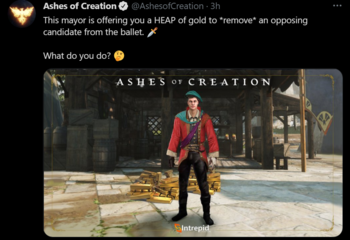
- ↑ Node series part II – the Metropolis.
- ↑ 7.0 7.1 Blog - Know Your Nodes - The Basics.
- ↑ 8.0 8.1 8.2

- ↑ Interview, May 11, 2018 (50:05).
- ↑ Livestream, August 31, 2023 (37:35).
- ↑ Livestream, November 17, 2017 (9:49).
- ↑ Livestream, September 29, 2023 (1:05:44).
- ↑ 13.0 13.1 13.2 13.3 13.4 13.5 13.6 13.7 13.8 Livestream, August 31, 2023 (39:17).
- ↑ Livestream, August 31, 2023 (43:07).
- ↑ 15.0 15.1 Interview, July 8, 2020 (1:04:05).
- ↑ 16.0 16.1 16.2 16.3 Livestream, August 31, 2023 (42:05).
- ↑

- ↑ Livestream, August 31, 2023 (43:27).
- ↑ 19.00 19.01 19.02 19.03 19.04 19.05 19.06 19.07 19.08 19.09 19.10 19.11 19.12 19.13 19.14 19.15 Livestream, August 31, 2023 (44:21).
- ↑ 20.00 20.01 20.02 20.03 20.04 20.05 20.06 20.07 20.08 20.09 20.10 20.11 20.12 20.13 20.14 20.15 Livestream, August 26, 2022 (1:12:40).
- ↑ 21.0 21.1 21.2 Livestream, April 29, 2022 (27:42).
- ↑ 22.0 22.1 22.2 22.3 Livestream, August 31, 2023 (47:43).
- ↑ Livestream, August 31, 2023 (49:13).
- ↑ 24.0 24.1 Livestream, April 7, 2023 (1:19:41).
- ↑ 25.0 25.1 Livestream, August 26, 2022 (1:17:04).
- ↑ 26.0 26.1 26.2 Livestream, August 31, 2023 (2:10:23).
- ↑ 27.0 27.1 Video, July 15, 2019 (2:12).
- ↑ 28.0 28.1 City hall.
- ↑ Livestream, 2018-04-8 (AM) (18:59).
- ↑ 30.0 30.1 Interview, July 19, 2020 (24:34).
- ↑ 31.0 31.1

- ↑ Video, April 5, 2018 (41:48).
